
The Hollies are an English rock and pop band formed in 1962. One of the leading British groups of the 1960s and into the mid-1970s, they are known for their distinctive three-part vocal harmony style. Allan Clarke and Graham Nash founded the band as a Merseybeat-type group in Manchester, although some of the band members came from towns further north, in east Lancashire. Nash left the group in 1968 to form Crosby, Stills & Nash, though he has reunited with the Hollies on occasion.

Two Yanks in England is an album by The Everly Brothers, released in 1966.

Butterfly is the seventh UK studio album by British band the Hollies, released in November 1967. It was the final Hollies album to feature Graham Nash before his departure from the group in 1968. The album consisted solely of songs written by the trio of Nash, Allan Clarke, and Tony Hicks, with Nash leading the sessions. It showcased the band's pop-oriented approach to psychedelia.

Harold Allan Clarke is an English rock singer, who was one of the founding members and the original lead singer of the Hollies. He achieved international hit singles with the group and is credited as co-writer on several of their best-known songs, including "On a Carousel", "Carrie Anne", "Jennifer Eccles" and "Long Cool Woman in a Black Dress". He retired from performing in 1999, but returned to the music industry in 2019. Clarke was inducted into the Rock and Roll Hall of Fame in 2010.

In The Hollies Style is the second album by the British rock band the Hollies and was released in November 1964 on Parlophone Records. It missed the official Record Retailer album chart in the United Kingdom, which at the time only had a total of 20 available spots. In Canada, it was released on Capitol in October 1965, with an altered track listing.

Evolution is the first of two albums released in 1967 by British pop rock band the Hollies. It is their sixth UK album and peaked at number 13 on the UK Albums Chart.
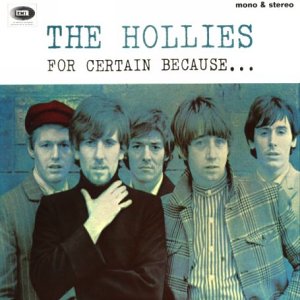
For Certain Because is the fifth UK album by the Hollies and their second released in 1966. It was the first Hollies album in which all the songs were written by members Allan Clarke, Graham Nash, and Tony Hicks, and the first on which they did not use the songwriting pseudonym "L. Ransford". It was also the first Hollies album recorded with new bassist Bernie Calvert replacing Eric Haydock. In Bobby Elliott's book It Ain't Heavy, It's My Story, he explains how he came up with the title For Certain Because by taking the three words from the children's song "Teddy Bears' Picnic".
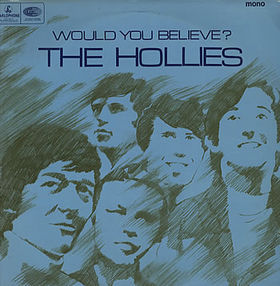
Would You Believe? is the fourth UK album by the Hollies, released in 1966.
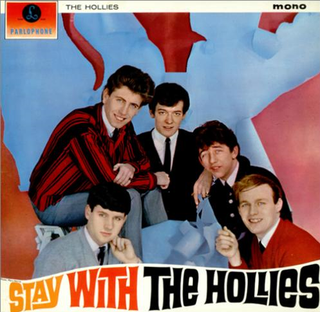
Stay with the Hollies, also known by its American release title Here I Go Again, is the debut album by the British rock band the Hollies and was released in January 1964 on Parlophone Records. In Canada, it was released on Capitol in July 1964, with a different track listing. In the US, Imperial Records issued the album under the title Here I Go Again in June 1964 to capitalize on the moderate success of the singles "Here I Go Again" and "Just One Look". It also features covers of well-known R&B songs, not unusual for Beat groups of the day.
Bernard Bamford Calvert is an English musician who played bass guitar and keyboards with The Hollies from 1966 until 1981.

Hollies is the Hollies' third studio album for Parlophone. It is also referred to as Hollies '65 to differentiate it from the similarly titled 1974 album. It went to No. 8 in the UK album charts. Originally available in mono only, it was reissued in stereo under the title Reflection in 1969. In 1997, British EMI put both mono and stereo versions of this album onto a single CD.
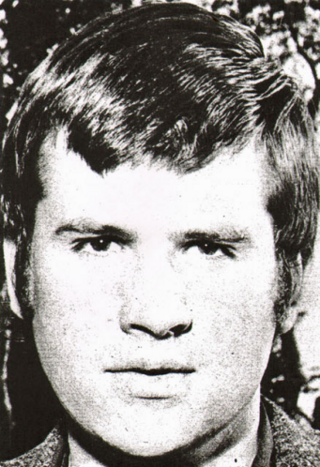
Eric Haydock was a British musician, best known as the original bass guitarist of the Hollies from December 1962 until July 1966.

The Hollies' Greatest Hits was the first greatest hits collection by English pop group the Hollies. The album was released by Imperial Records in the US in May 1967 and by Capitol Records in Canada, under the title The Hits of the Hollies and with two different tracks, in July 1967. It was the Hollies' highest charting album in the US, peaking at number eleven during a chart stay of forty weeks. When Imperial was dissolved into United Artists Records in 1971, this album went out of print, prompting Epic to issue its own "Greatest Hits" album two years later.

The Hollies' Greatest Hits is a compilation of singles by the Hollies, released on Epic Records in April 1973. It includes hit singles by the group on both the Epic and Imperial labels over a time span of 1965 to 1972. It spent seven weeks on the Billboard 200 charts, peaking at number 156.

Hollies Sing Hollies is the ninth studio album released in the UK by the Hollies. It was released in November 1969 by Parlophone. It was their second album that year, coming 6 months after an entire album of Bob Dylan covers. It was their first album of original compositions since the departure of Graham Nash. It was also the second album by the Hollies to feature Terry Sylvester and the first to feature his compositions, as well as an instrumental by bassist Bernie Calvert. The US version, titled "He Ain't Heavy, He's My Brother", included the hit single of the same name, while omitting the tracks "Soldier's Dilemma" and "Marigold: Gloria Swansong". The UK album did not chart, but its US version peaked at number 32.

Here I Go Again is the title of the third EP by The Hollies. It was put out by Parlophone in mono with the catalogue number GEP 8915 and released in the UK in October 1964. All songs on this EP were previously released by the Hollies at the time. Side A consisted of covers of R&B songs, tracks from the band's debut album, Stay with the Hollies while the B-side contained both sides of the "Here I Go Again" single from May 1964.

Clarke, Hicks & Nash Years: The Complete Hollies April 1963 – October 1968 is a 6-CD box set released in the United Kingdom by EMI Records in 2011. As the title suggests, it encompasses, in chronological order by recording date, almost every song The Hollies have released to date that was recorded between April 1963 and October 1968, when Graham Nash left the band. Included were 14 previously unreleased tracks such as French-language versions of hit songs, alternate stereo mixes and a live set from the Lewisham Odeon recorded 24 May 1968. Besides various mono and stereo mixes of tracks, previously released material excluded from the set were the alternate version of "Stay" from the 1988 UK The Hollies: Compacts for Pleasure CD and the longer Take 9 of "Poison Ivy" from their first Australian LP.

Hollies' Greatest is the only number one album in the UK by British band the Hollies. It was released shortly before Graham Nash's departure from the Hollies and was intended to include all of their British hit singles with Nash, as well as filling in for the lack of an original LP by the group in 1968. Only 3 of the 14 songs on the album – "Stay", "I Can't Let Go" and "Stop! Stop! Stop!" had previously been released on UK albums.
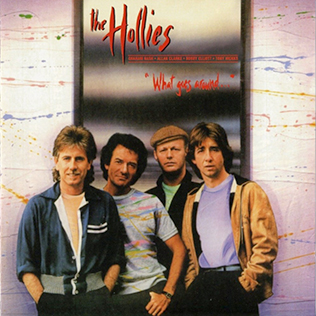
What Goes Around... is the 21st studio album by English rock/pop group, the Hollies. It includes their version of The Supremes' "Stop! In the Name of Love", which became their last US hit single. The Hollies reunited with Graham Nash for this album and for the following US tour. The LP was the band's first and last album with Nash since Butterfly (1967) and also their last one with lead singer Allan Clarke. Among the guest musicians, you can find Brian Chatton who was formerly keyboardist for The Warriors with Jon Anderson, and Flaming Youth with Phil Collins.


















